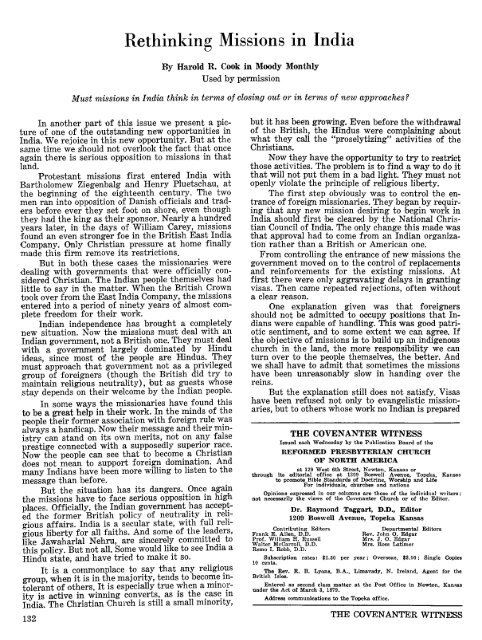Covenanter Witness Vol. 53 - Rparchives.org
Covenanter Witness Vol. 53 - Rparchives.org
Covenanter Witness Vol. 53 - Rparchives.org
You also want an ePaper? Increase the reach of your titles
YUMPU automatically turns print PDFs into web optimized ePapers that Google loves.
RethinkingMissions in IndiaBy Harold R. Cook in Moody MonthlyUsed by permissionMust missions in India think in terms of closing out or in terms ofnew approaches ?In another part of this issue we present a picture of one of the outstanding new opportunities inIndia. We rejoice in this new opportunity. But at thesame time we should not overlook the fact that onceagain there is serious opposition to missions in thatland.Protestant missions first entered India withBartholomew Ziegenbalg and Henry Pluetschau, atthe beginning of the eighteenth century. The twomen ran into opposition of Danish officials and traders before ever they set foot on shore, even thoughthey had the king as their sponsor. Nearly a hundredyears later, in the days of William Carey, missionsfound an even stronger foe in the British East IndiaCompany. Only Christian pressure at home finallymade this firm remove its restrictions.But in both these cases the missionaries weredealing with governments that were officially considered Christian. The Indian people themselves hadlittle to say in the matter. When the British Crowntook over from the East India Company, the missionsentered into a period of ninety years of almost complete freedom for their work.Indian independence has brought a completelynew situation. Now the missions must deal with anIndian government, not a British one. They must dealwith a government largely dominated by Hinduideas, since most of the people are Hindus. Theymust approach that government not as a privilegedgroup of foreigners (though the British did try tomaintain religious neutrality), but as guests whosestay depends on their welcome by the Indian people.In some ways the missionaries have found thisto be a great help in their work. In the minds of thepeople their former association with foreign rule wasalways a handicap. Now their message and their ministry can stand on its own merits, not on any falseprestige connected with a supposedly superior race.Now the people can see that to become a Christiandoes not mean to support foreign domination. Andmany Indians have been more willing to listen to themessage than before.But the situation has its dangers. Once againthe missions have to face serious opposition in highplaces. Officially, the Indian government has accepted the former British policy of neutrality in religious affairs. India is a secular state, with full religious liberty for all faiths. And some of the leaders,fike Jawaharlal Nehru, are committed sincerely tothis policy. But not all. Some would like to see India aHindu state, and have tried to make it so.It is a commonplace to say that anyreligiousgroup, when it is in the majority, tends to become intolerant of others. It is especially true when a minority is active in winning converts, as is the case inIndia. The Christian Church is still a small minority,132but it has been growing. Even before the withdrawalof the British, the Hindus were complaining aboutwhat they call the "proselytizing" activities of theChristians.Now they have the opportunity to try to restrictthose activities. The problem is to find a way to do itthat will not put them in a bad light. They must notviolate the principle of religious liberty.openlyThe first step obviously was to control the entrance of foreign missionaries. They began by requiring that any new mission desiring to begin work inIndia should first be cleared by the National Christian Council of India. The only change this made wasthat approval had to come from an Indian <strong>org</strong>anization rather than a British or American one.From controlling the entrance of new missions thegovernment moved on to the control of replacementsand reinforcements for the existing missions. Atfirst there were only aggravating delays in grantingvisas. Then came repeated rejections, often withouta clear reason.One explanation given was that foreignersshould not be admitted to occupy positions that Indians were capable of handling. This was good patriotic sentiment, and to some extent we can agree. Ifthe objective of missions is to build up an indigenouschurch in the land, the more responsibility we canturn over to the people themselves, the better. Andwe shall have to admit that sometimes the missionshave been unreasonably slow in handing over thereins.But the explanation still does not satisfy. Visashave been refused not only to evangelistic missionaries, but to others whose work no Indian is preparedTHE COVENANTER WITNESSIssued each Wednesday by the Publication Board of theREFORMED PRESBYTERIAN CHURCHOF NORTH AMERICAat 129 West 6th Street, Newton, Kansas orthrough its editorial office at 1209 Boswell Avenue, Topeka, Kansasto promote Bible Standards of Doctrine, Worship and LifeFor individuals, churches and nationsOpinions expressed in our columns are those of the individual writers ;not necessarily the views of the <strong>Covenanter</strong> Church or of the Editor.Dr. Raymond Taggart, D.D., Editor1209 Boswell Avenue, Topeka KansasContributing EditorsFrank E. Allen, D.D.Prof. William H. RussellWalter McCarroll, D.D.Remo I. Robb, D.D.Departmental EditorsRev. John O. EdgarMrs. J. O. EdgarMrs. Ross LatimerSubscription rates: $2.50 per year; Overseas, $3.00; Single Copies10 cente.The Rev. R. B. Lyons, B.A,, Limavady, N. Ireland, Agent for theBritish Isles.Entered as second class matter at the Post Office in Newton, Kansasunder the Act of March 3, 1879.Address communications to the Topeka office.THE COVENANTER WITNESS
















